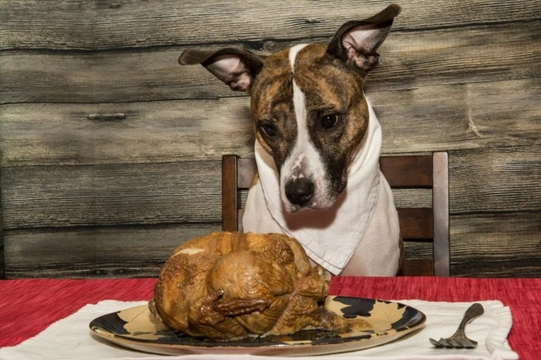
What Christmas foods can you give to your dog?
An awful lot of advice and information is available about what Christmas foods are dangerous to dogs, and this is very important. Christmas is actually the busiest time of the year in veterinary clinics when it comes to cases of accidental food-based poisoning in dogs, with the number one culprit rather predictably being chocolate.
Additionally, the list of Christmas foods that are poisonous to dogs is fairly long, and accounts for many of our favourites; largely because they tend to combine a number of ingredients (and so increase the odds that one of the ingredients will happen to be toxic to dogs).
Coupled with this, even when you know and rule out the Christmas foods that are directly toxic or poisonous to dogs, much of what is left might not be outright poisonous to your pooch, but will be far too high in fat, sugar or salt for them, to the point that it stands a reasonably good chance of upsetting their stomach if they ate it.
So, are there any Christmas foods you can share with your dog, and is it possible to make your dog a Christmas dinner as a treat without upsetting their stomach or giving them something that might make them acutely sick?
Yes, if you proceed with caution. This article will list off some Christmas foods you can give to your dog, as long as you do this in moderation and with care (such as by ensuring that there aren’t hidden ingredients or seasonings involved that are poisonous to your dog, and by trimming the fat from meat).
Read on to find out what Christmas foods you can give to your dog safely; in moderation!
Turkey or chicken meat
The meat from turkey or chicken (not the cooked bones, and avoiding skin or fatty areas) is fine to give to your dog. For turkey, the white meat is a better pick, and restrict this to a couple of slices only, cut with the size of your own dog in mind.
Ensure no garlic, onion, or similar vegetables have been used to garnish the meat either.
Salmon and prawns
Plain salmon fillet that has been roasted or poached in spring water, and plain cooked shrimp or prawns are ok to feed to dogs at Christmas in small quantities. Once more, nothing garnished, and for salmon, dogs can have smoked salmon but will probably prefer it plain.
Lamb meat
Lamb meat is just about on the right side of “not too unhealthy” where dogs are concerned, as long as you trim any fat and don’t give them too much, as lamb is very rich (and delicious)!
Plain scrambled egg
If you’re enjoying a luxurious Christmas day breakfast of salmon and scrambled eggs, your dog can have some of the egg as well as the salmon. Ensure the dog’s portion isn’t seasoned, and also that it has little to no milk or butter added; dogs are actually fairly lactose intolerant, and also butter is of course a pure fat.
Certain roast vegetables
As long as your Christmas dinner vegetables aren’t garnished with things that are toxic to dogs, they can enjoy quite a few of the veggies you’ll have with your roast.
This includes Brussel sprouts (although they can make your dog gassy, so be sure you’re ready for the consequences…), green beans, peas, carrots, and parsnips.
New potatoes
Roast potatoes tend to be cooked in fat and so aren’t a good choice to give to your dog at Christmas, but new potatoes cooked in water and thoroughly cooled are fine in moderation.
Mashed swede or potato
Mashed potato or mashed swede are ok for dogs too, as long as they don’t have salt, pepper, or a lot of butter added. Swede is a little better than potato, and all should be given in moderation.
Sweet potato or yam
Roasted sweet potato or yam, as long as they’re not cooked in a lot of fat, are ok to add to your dog’s own Christmas dinner too.
Gravy, with caution
Many gravy mixes and homemade gravies contain onion and/or garlic, which are toxic to dogs. However, if your own gravy doesn’t have products from this family in them and you don’t add fat from the meat, a thin plain gravy is fine for your dog’s Christmas dinner; and can make their slices of meat and veg into a proper reward to enjoy with the family.
Why no other meats?
Chicken, turkey, and lean lamb meat all made the list of Christmas foods that are ok to give to your dog, but you may have noticed that many other popular Christmas roast meats did not; including beef, duck, goose, and pork products too.
While none of these are poisonous to dogs, they are all very fatty (even the leaner cuts) and apt to be too rich for your dog as a result; while your dog will no doubt be more than keen to eat as much as you’ll feed to them, these meats aren’t good to give to dogs, even as a treat.



